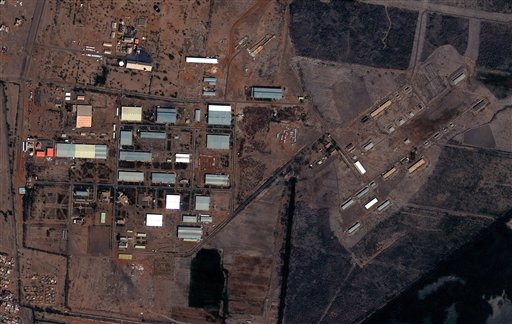
CAIRO (AP) — Satellite images of the aftermath of an explosion at a Sudanese weapons factory this past week suggest the site was hit in an airstrike, a U.S. monitoring group said Saturday.
The Sudanese government has accused Israel of bombing its Yarmouk military complex in Khartoum, killing two people and leaving the factory in ruins.
The images released by the Satellite Sentinel Project to The Associated Press on Saturday showed six 52-foot (16-meter) wide craters near the epicenter of Wednesday's explosion at the compound.
Military experts consulted by the project found the craters to be "consistent with large impact craters created by air-delivered munitions, Satellite Sentinel Project spokesman Jonathan Hutson told the AP.
The target may have been around 40 shipping containers seen at the site in earlier images. The group said the craters center on the area where the containers had been stacked. It did not comment on the allegations of Israeli involvement or who might be behind the strikes.
Jonah Leff, who monitors Sudan for the Geneva-based Small Arms Survey and was not connected to the project, reviewed the images on Saturday and agreed with the group's assessment.
Israeli officials have neither confirmed nor denied striking the site. Instead, they accused Sudan of playing a role in an Iranian-backed network of arms shipments to Hamas and Hezbollah. Israel believes Sudan is a key transit point in the circuitous route that weapons take to the Islamic militant groups in the Gaza Strip and Lebanon.
Sudan was a major hub for al-Qaida militants and remains a transit for weapon smugglers and African migrant traffickers. Israeli officials believe arms that originate in the Iranian port of Bandar Abbas go through Sudan before crossing Egypt's lawless Sinai desert and into Gaza through underground tunnels.
The Satellite Sentinel Project is a partnership between the Enough Project, a Washington-based anti-genocide advocacy group and DigitalGlobe, which operates three commercial satellites and provides geospatial analysis. The project was founded last year with support from actor George Clooney, and in the past has used satellite images to monitor the destruction of villages by Sudanese troops in the country's multiple war zones.
Opened in 1996, Yarmouk is one of two known state-owned weapons manufacturing plants in the Sudanese capital. Sudan prided itself in having a way to produce its own ammunition and weapons despite United Nations and U.S. sanctions.
The satellite images indicate that the Yarmouk facility includes an oil storage facility, a military depot and an ammunition plant.
The monitoring group said the images indicate that the blast "destroyed two buildings and heavily damaged at least 21 others," adding that there was no indication of fire damage at the fuel depot inside the military complex.
The group said it could not be certain the containers, seen in images taken Oct. 12, were still there when explosion took place. But the effects of the blast suggested a "highly volatile cargo" was at the epicenter of the explosion.
"If the explosions resulted from a rocket or missile attack against material stored in the shipping containers, then it was an effective surgical strike that totally destroyed any container" that was at the location, the project said.
Yarmouk is located in a densely populated residential area of the city approximately 11 kilometers (seven miles) southwest of the Khartoum International Airport.
Wednesday's explosion sent exploding ammunition flying into homes in the neighborhood adjacent to the factory, causing panic among residents. Sudanese officials said some people suffered from smoke inhalation.
A man who lives near the factory said that from inside their house, he and his brother heard a load roar of what they believed was a plane just before the boom of the explosion sounded from the factory.
In the aftermath of Wednesday's explosion, Sudanese officials said the government has the right to respond to what the information minister said was a "flagrant attack" by Israel on Sudan's sovereignty and right to strengthen its military capabilities.
In a Friday speech marking Eid al Adha, Islam's biggest holiday, Sudanese president Omar al-Bashir called Israel "short-sighted," according to comments published by the Egyptian state-owned paper Al Ahram. The president likened the incident to the 1998 bombing by American cruise missiles of a Khartoum pharmaceutical factory suspected of links to al-Qaida.
Some Israeli commentators suggested that if Israel did indeed carry out an airstrike causing Wednesday's blast, it might have been a trial run of sorts for an operation in Iran. Both countries are roughly 1,000 miles (1,600 kilometers) away from Israel, and an air operation would require careful planning and in-flight refueling.